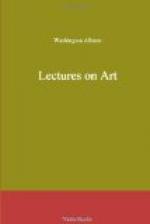Of the tendency to particular pursuits,—to art, science, or any particular course of life,—we do not speak; the bias we allude to is in the more personal disposition of the man,—in that which gives a tone to his internal character; nor is it material of what proportions compounded, of the affections, or the intellect, or the senses,—whether of some only, or the whole; that these form the ground of every man’s bias is no less certain, than the fact that there is scarcely any secret which men are in the habit of guarding with such sedulous care. Nay, it would seem as if every one were impelled to it by some superstitious instinct, that every one might have it to say to himself, There is one thing in me which is all my own. Be this as it may, there are few things more hazardous than to pronounce with confidence on any man’s bias. Indeed, most men would be puzzled to name it to themselves; but its existence in them is not the less a fact, because the form assumed may be so mixed and complicated as to be utterly undefinable. It is enough, however, that every one feels, and is more or less led by it, whether definite or not.
This being the case, how is it possible that it should not in some degree affect our feelings towards every one we meet,—that it should not leave some speck of leaven on each impression, which shall impregnate it with something that we admire and love, or else with that which we hate and despise?
And what is the most beautiful or the most ungainly form before a sorcerer like this, who can endow a fair simpleton with the rarest intellect, or transform, by a glance, the intellectual, noble-hearted dwarf to an angel of light? These, of course, are extreme cases. But if true in these, as we have reason to believe, how formidable the power!
But though, as before observed, we may not read this secret with precision, it is sometimes possible to make a shrewd guess at the prevailing tendency in certain individuals. Perhaps the most obvious cases are among the sanguine and imaginative; and the guess would be, that a beautiful person would presently be enriched with all possible virtues, while the colder speculatist would only see in it, not what it possessed, but the mind that it wanted. Now it would be curious to imagine (and the case is not impossible) how the eyes of each might be opened, with the probable consequence, how each might feel when his eyes were opened, and the object was seen as it really is. Some untoward circumstance comes unawares on the perfect creature: a burst of temper knits the brow, inflames the eye, inflates the nostril, gnashes the teeth, and converts the angel into a storming fury. What then becomes of the visionary virtues? They have passed into air, and taken with them, also, what was the fair creature’s right,—her very beauty. Yet a different change takes place with the dry man of intellect. The mindless object has taken shame of her ignorance; she begins to cultivate her powers,




